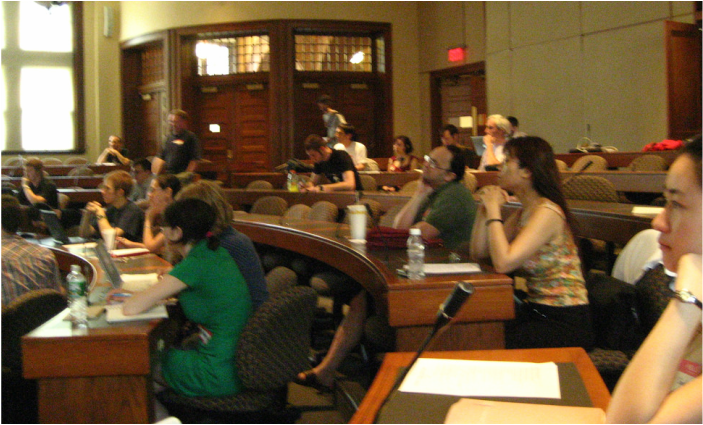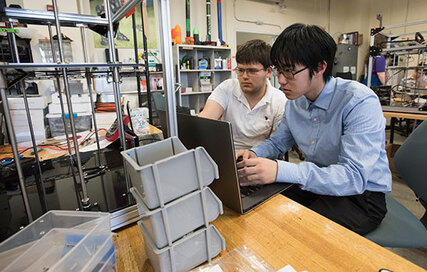|
Colleges are enrolling more students on the autism spectrum. However, one-third of the graduates with autism are not finding jobs. Here is how Rochester Institute of Technology is trying to change that with their Career Ready Bootcamp.
The Center for the Analysis of Postsecondary Readiness reports that the use of placement tests alone are poor indicators of which students actually need remediation at college. Virtually all community colleges and over 90% of public 4 year colleges utilize the results of placement tests to determine need for remedial help in math and English. A study found that whether or not a student was predicted to succeed, students did better when they were allowed to start in college level courses. Using multiple measures including high school GPA, more students are assigned to college level courses and are more likely to complete them.
 THIS IS A SECOND IN A 2-PART SERIES BY Bonni Alpert, Ed.D. Assistant Dean, Office of Student Disability Services Western New England University As students eagerly anticipate the ‘independence’ that awaits them, as they embark on this new life phase in a post-secondary world, parents are often left wondering, “how do I let go, give my child space, and also help my child learn how to navigate this new, and sometimes daunting, experience?” This can be compounded for parents of students with disabilities. One reason for this is that, while many of these parents may have attended college themselves, they have never attended college as a student with a disability. And, because of this, it is much more difficult to know first-hand what their child is experiencing, and then to help them navigate, from what may seem to be a very foreign vantage point. Another reason for this is the fact that many of these parents have spent the last 18 years advocating on behalf of their child to make sure that he/she is supported and able to successfully transition through the K-12 educational system, in hopes that they will do what most students do – go on to college. It is difficult to let go of a job you’ve been doing for so long – especially when there is so much love invested and the stakes are so high. In my 25+ years of supporting/ensuring access to students with disabilities in higher education, I have witnessed, hundreds of times over, how well-meaning parents have unintentionally sabotaged their child’s success in their college and vocational pursuits, just because they weren’t aware of the following key points:
 As students eagerly anticipate the ‘independence’ that awaits them, as they embark on this new life phase in a post-secondary world, parents are often left wondering, “how do I let go, give my child space, and also help my child learn how to navigate this new, and sometimes daunting, experience?” This can be compounded for parents of students with disabilities. One reason for this is that, while many of these parents may have attended college themselves, they have never attended college as a student with a disability. And, because of this, it is much more difficult to know first-hand what their child is experiencing, and then to help them navigate, from what may seem to be a very foreign vantage point. Another reason for this is the fact that many of these parents have spent the last 18 years advocating on behalf of their child to make sure that he/she is supported and able to successfully transition through the K-12 educational system, in hopes that they will do what most students do – go on to college. It is difficult to let go of a job you’ve been doing for so long – especially when there is so much love invested and the stakes are so high. In my 25+ years of supporting/ensuring access to students with disabilities in higher education, I have witnessed, hundreds of times over, how well-meaning parents have unintentionally sabotaged their child’s success in their college and vocational pursuits, just because they weren’t aware of the following key points:
Accommodations are approved for access, to help level the playing field for students with disabilities. Therefore, certain accommodations will not be approved, unless it is clear that the accommodation will remove a barrier, and/or will help to mitigate the impact of a disability. Support Services (tutoring, mentoring, etc.) are not accommodations, but are designed to increase the chances for the student’s success. While disability accommodations are a legal requirement for post-secondary institutions, colleges and universities vary with respect to the quantity and quality of the support services they provide. Written by Bonni Alpert, Ed.D. Assistant Dean, Office of Student Disability Services Western New England University It is a year or two into high school and before you know it, parents and teachers are talking about colleges. While some students may also be thinking about colleges, others remain in the moment. Life after high school may seem very far off, especially to a student who might be experiencing the complications of learning differences, executive functioning issues, ADHD, Asperger’s, physical disabilities, or health issues.
While in high school, services may be provided to students with disabilities through an IEP or a 504 plan. Students may have accommodations in the classroom for note taking, testing, and/or assignments, or may be receiving direct services with a special educator. The federal government guarantees all students appropriate educational services to meet their needs in order to benefit from their academic program. However, once a student graduates from high school, the landscape of service provision changes. Colleges do not provide an IEP or a 504 plan. They are not required to seek out students who need services or accommodations. While it is not necessary to self-identify during the application process, once enrolled it is the student’s responsibility to self-identify to the school to receive services. The good news is that more colleges and universities now provide support for students with disabilities. The federal government, through the Americans with Disabilities Act, ensures that students with disabilities are provided with accommodations to ensure access to learning. However, there are no universal guidelines for how disability services will be provided, monitored, or executed, nor how involved a professor will be in following up with what the student may need to succeed in college. This is where planning ahead will be very helpful. It is important to know what your learning style is and which accommodations and/or services have been helpful in the past. Given the differences in instructional demands between high school and college, students need to consider what services or accommodations might be needed. Having an overall assessment of strengths and areas of need will also guide you in your search for a college which complements your individual needs and abilities. In fact, most colleges will require a recent psycho-educational evaluation prior to the student receiving any services. The range of possibilities for how disability services are provided is very broad. Typically, colleges may offer accommodations such as untimed tests or distraction-free environments for taking exams. Other schools may offer more comprehensive options, such as the support of a learning specialist, socialization programs or incorporate dedicated housing with supportive services. Some schools offer services inclusive with tuition. Others may have hourly fees for specific services. Will still others may charge additional fees for special programs. Most significant for you, the student, is to be aware of your needs and to consider the services available at a particular school before making a decision to attend. Students who have received services earlier in their schooling often do not expect to need or use these services in college. However, one must consider the differences between high school and college expectations. It is better to have services available, should you need them, than to find yourself in a setting which does not support your particular needs, whether educational, psychological, or physical. Students have the freedom to choose whether and/or when to use or to discontinue available services. Having the choice is the key. Feel free to contact College Docs for a consultation and be assured that your questions and concerns will be addressed individually and confidentially. |
Categories
All
Archives
July 2024
Contact College Docs at
203 520-6338 or 203 218-5619 [email protected] |


 RSS Feed
RSS Feed